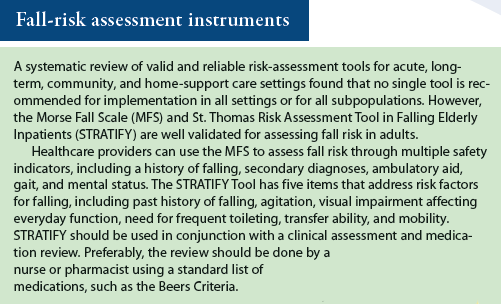What Does Dementia Fall Risk Do?
Table of ContentsThe Best Guide To Dementia Fall RiskDementia Fall Risk - The FactsA Biased View of Dementia Fall RiskThe Ultimate Guide To Dementia Fall RiskThe Main Principles Of Dementia Fall Risk
Ensure that there is a marked location in your medical charting system where staff can document/reference ratings and document appropriate notes related to fall avoidance. The Johns Hopkins Autumn Danger Assessment Device is one of several devices your staff can use to help protect against adverse medical events.Patient falls in medical facilities are common and debilitating negative events that persist in spite of decades of effort to lessen them. Improving communication throughout the assessing nurse, treatment group, client, and person's most entailed pals and family members may strengthen loss prevention initiatives. A team at Brigham and Female's Healthcare facility in Boston, Massachusetts, looked for to establish a standard autumn prevention program that focused around improved interaction and patient and family involvement.

The technology group highlighted that successful execution relies on individual and personnel buy-in, integration of the program into existing operations, and integrity to program processes. The group kept in mind that they are coming to grips with how to ensure connection in program application throughout durations of crisis. Throughout the COVID-19 pandemic, as an example, an increase in inpatient drops was connected with restrictions in patient involvement in addition to constraints on visitation.
The Only Guide for Dementia Fall Risk
These events are generally considered preventable. To execute the treatment, organizations require the following: Access to Autumn TIPS sources Loss suggestions training and re-training for nursing and non-nursing personnel, consisting of new registered nurses Nursing operations that enable person and family involvement to conduct the drops assessment, guarantee use the prevention plan, and conduct patient-level audits.
The outcomes can be very harmful, usually accelerating individual decrease and causing longer hospital keeps. One research study approximated keeps increased an extra 12 in-patient days after a person fall. The Autumn TIPS Program is based on interesting people and their family/loved ones across three primary procedures: analysis, individualized preventative interventions, and auditing to make sure that people are engaged in the three-step fall prevention process.
The individual analysis is based upon the Morse Fall Scale, which is a verified loss threat analysis tool for in-patient hospital settings. The scale includes the six most usual reasons clients in healthcare facilities drop: the client autumn history, high-risk conditions (including polypharmacy), use IVs and various other exterior devices, mental standing, stride, and flexibility.
Each risk variable relate to one or more actionable evidence-based interventions. The nurse develops a strategy that integrates the treatments and is noticeable to the treatment team, patient, and family members on a laminated poster or published visual aid. Registered nurses establish the strategy while fulfilling with the client and the patient's household.
Some Known Factual Statements About Dementia Fall Risk
The poster acts as an interaction device with other participants of the individual's care group. Dementia Fall see post Risk. The audit part of the program consists of examining the patient's expertise of their danger factors and avoidance plan at the unit and health center degrees. Nurse champs carry out at the very least five specific interviews a month with clients and their families to look for understanding of the autumn avoidance strategy

An approximated 30% of these falls result in injuries, which can range in extent. Unlike various other negative events that require a standard professional action, autumn prevention depends very on the requirements of the client. Including the input of individuals who know the patient ideal permits higher personalization. This approach has actually verified to be much more effective than autumn prevention programs that are based largely on the manufacturing of a risk score and/or are not customizable.
5 Easy Facts About Dementia Fall Risk Explained

Based upon auditing outcomes, one website had 86% compliance and 2 sites had over 95% conformity. A cost-benefit analysis of the Loss TIPS program in eight health centers estimated that the see this here program cost $0.88 per person to carry out and resulted in financial savings of $8,500 per 1000 patient-days in straight prices associated with the prevention of 567 tips over 3 years and 8 months.
According to the advancement team, companies interested in carrying out the program needs to conduct a preparedness assessment and drops prevention spaces analysis. 8 Furthermore, organizations must make certain the necessary framework and operations for execution and develop an execution plan. If one exists, the company's Fall Avoidance Task Force need to be involved in planning.
Some Known Questions About Dementia Fall Risk.
To start, companies need to ensure completion of training components by registered nurses and nursing assistants - Dementia Fall Risk. Hospital personnel ought to evaluate, based on the requirements of a health center, whether to use an electronic health and wellness document hard copy or paper variation of the fall prevention plan. Executing teams ought to recruit and train registered nurse champs and develop procedures for bookkeeping and coverage on loss information
Team require to be entailed in the procedure of upgrading the workflow to engage people and household in the assessment and avoidance strategy procedure. Solution must remain in location to ensure about his that systems can comprehend why a fall took place and remediate the reason. A lot more particularly, nurses ought to have channels to offer continuous feedback to both staff and device management so they can change and enhance fall prevention operations and connect systemic troubles.